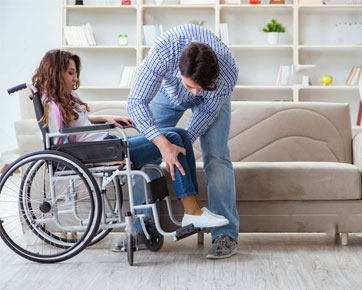Assistance with NDIS Daily Personal Activities in St Albans
Are you looking for the most competent and quality support workers who could address your mobility issues and impairments and assist you perform your daily activities with as much autonomy as possible? Your search ends at Careon. Ever since we started our endeavour, we have always looked forward to helping you meet the objectives of and let you live the life of your choice. Our NDIS Daily Personal Activities in St Albans are tailored to meet your bespoke needs of life, thus letting you live that leaves you 100% satisfied. So do not let the thoughts of your limitations and impairments overwhelm you! Just call us to see how we can change your life.
Why Are Our Daily Personal Activities Support So Adored?


What Does Our NDIS Assistance with Daily Personal Activities near St Albans Include?
- Assistance with showering and bathing, grooming and dressing, toileting, and others daily personal care & hygiene activities
- Assistance with cleaning, preparation as well as delivery of meals, folding clothes & linen, laundry works and preparation of bed, general gardening activities and other day to day household tasks
- Moving in and out of bed, assistance with the use of various mobility tools and other aids
- Planning everyday routine, and follow up of medications and healthcare routine
FAQ's
Daily activities in NDIS are the household routines and tasks that people with disabilities need assistance with to live independently and pursue their goals. Some examples of daily activities are:
- Showering, dressing, and grooming
- Meal planning and preparation
- Household cleaning and gardening
- Medication management
- Community access and transportation
- Shopping and cooking
- Physical fitness training
Self care activities for NDIS are the activities that help you maintain your personal hygiene, health, and well-being. They may include:
Bathing, showering, brushing teeth, dressing, and grooming: These are the basic tasks that help you keep clean and comfortable. They may also involve assistance with bladder management, bowel management, menstrual care, and skin care.
Assistance with eating and drinking: This may include help with preparing meals, feeding, swallowing, and taking medication. Eating and drinking are essential for your nutrition and hydration.
Mobility and exercise: This may include help with moving around, transferring, positioning, and stretching. Mobility and exercise are important for your physical fitness, circulation, and prevention of pressure sores
Attending medical appointments: This may include help with booking, travelling, and communicating with health professionals. Attending medical appointments is important for your medical care and prevention of complications1.
Using hearing aids, communication devices, and appliances: This may include help with operating, maintaining, and repairing these devices. Using these devices is important for your communication, hearing, and safety.
These are some examples of self care activities for NDIS, but there may be other activities that are relevant for your individual needs and goals. The NDIS can provide funding for supports that help you with your self care activities, depending on your eligibility and plan
The NDIS provides funding for supports that help participants with their daily activities, depending on their individual needs and goals. The funding is divided into three types of support budgets: Core, Capacity Building, and Capital. The Core budget is the most flexible and can be used for any of the four categories of support: Consumables, Daily Activities, Assistance with Social and Community Participation, and Transport. The Capacity Building budget is allocated across eight categories of support, each matched with the goals in the plan, and cannot be moved from one category to another. The Capital budget is for higher-cost items such as assistive technology, home modifications, or Specialist Disability Accommodation.
An NDIS plan is a document that sets out your goals and the supports that will help you pursue those goals. It is based on your individual needs and preferences, and it is created by you and the NDIS. An NDIS plan should include the following information:
Information about you: This section includes basic information about your disability, your day-to-day activities, where you live, who you live with, or who cares for you.
Family and friends: This section includes information about the support you get from family and friends that is not funded but will help you pursue your goals.
Services and community groups: This section includes information about services and supports funded and delivered by community or other government services like support groups, health centres, libraries and public transport.
Your goals: This section includes the current goals you would like to pursue as part of your plan and the long-term goals you have identified for your life. Goal-setting is an important part of the NDIS. The supports you receive may help you pursue the goals in your NDIS plan.
Funded supports: This section tells you what funding you have been allocated in each support category and what this funding is for. You may not have all the support categories funded in your plan. Some people might have one or two support categories funded and others may have more. This will depend on your individual needs and may change from plan to plan based on the supports and services you need. Your funding is based on what is reasonable and necessary for your needs, in addition to the support provided by family, friends and other community and government services that you need to live your life. You must only use your NDIS funding on supports and services that are related to your disability.
Dial Us to See How We Can Make Your Life Better
So, whenever you need assistance with your NDIS daily personal activities, you can fix a meeting with our experts, or fill out the form on our website and submit. We will get back to you immediately. Contact us now.
